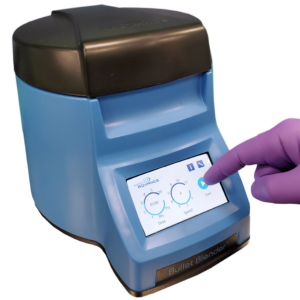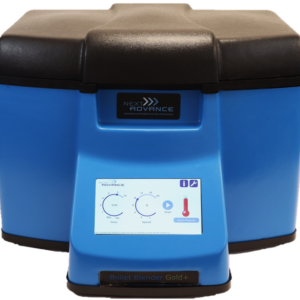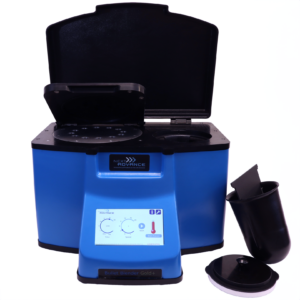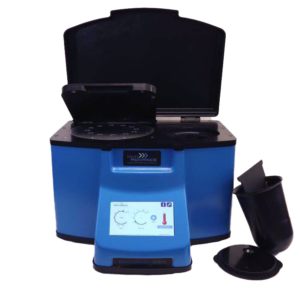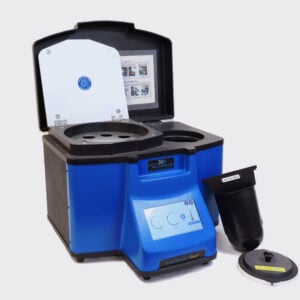Ideal for Bladder Tissue Homogenization
Do you spend lots of time and effort homogenizing bladder tissue samples? The Bullet Blender® tissue homogenizer delivers high quality and superior yields. No other homogenizer comes close to delivering the Bullet Blender’s winning combination of top-quality performance and budget-friendly affordability. See below for a bladder tissue homogenization protocol.
Save Time, Effort and Get Superior Results with
The Bullet Blender Homogenizer
Consistent and High Yield Results
Run up to 24 samples at the same time under microprocessor-controlled conditions, ensuring experimental reproducibility and high yield. Process samples from 10mg or less up to 3.5g.No Cross Contamination
No part of the Bullet Blender ever touches the tissue – the sample tubes are kept closed during homogenization. There are no probes to clean between samples.Samples Stay Cool
The Bullet Blenders’ innovative and elegant design provides convective cooling of the samples, so they do not heat up more than several degrees. In fact, our Gold+ models hold the sample temperature to about 4ºC.Easy and Convenient to Use
Just place beads and buffer along with your tissue sample in standard tubes, load tubes directly in the Bullet Blender, select time and speed, and press start.Risk Free Purchase
Thousands of peer-reviewed journal articles attest to the consistency and quality of the Bullet Blender homogenizer. We offer a 2 year warranty, extendable to 4 years, because our Bullet Blenders are reliable and last for many years.Bladder Tissue Homogenization Protocol
| Sample Tube | Protocol |
|---|---|
| 1.5 mL tubes | 1.5 mL tubes Bladder Protocol |
| 1.5/2 mL tubes in 5 mL adapters | 1.5/2 mL tubes in 5 mL adapters Bladder Protocol |
| 5 mL tubes | 5 mL tubes Bladder Protocol |
What Else Can You Homogenize? Tough or Soft, No Problem!
The Bullet Blender can process a wide range of samples including organ tissue, cell culture, plant tissue, and small organisms. You can homogenize samples as tough as mouse femur or for gentle applications such as tissue dissociation or organelle isolation.
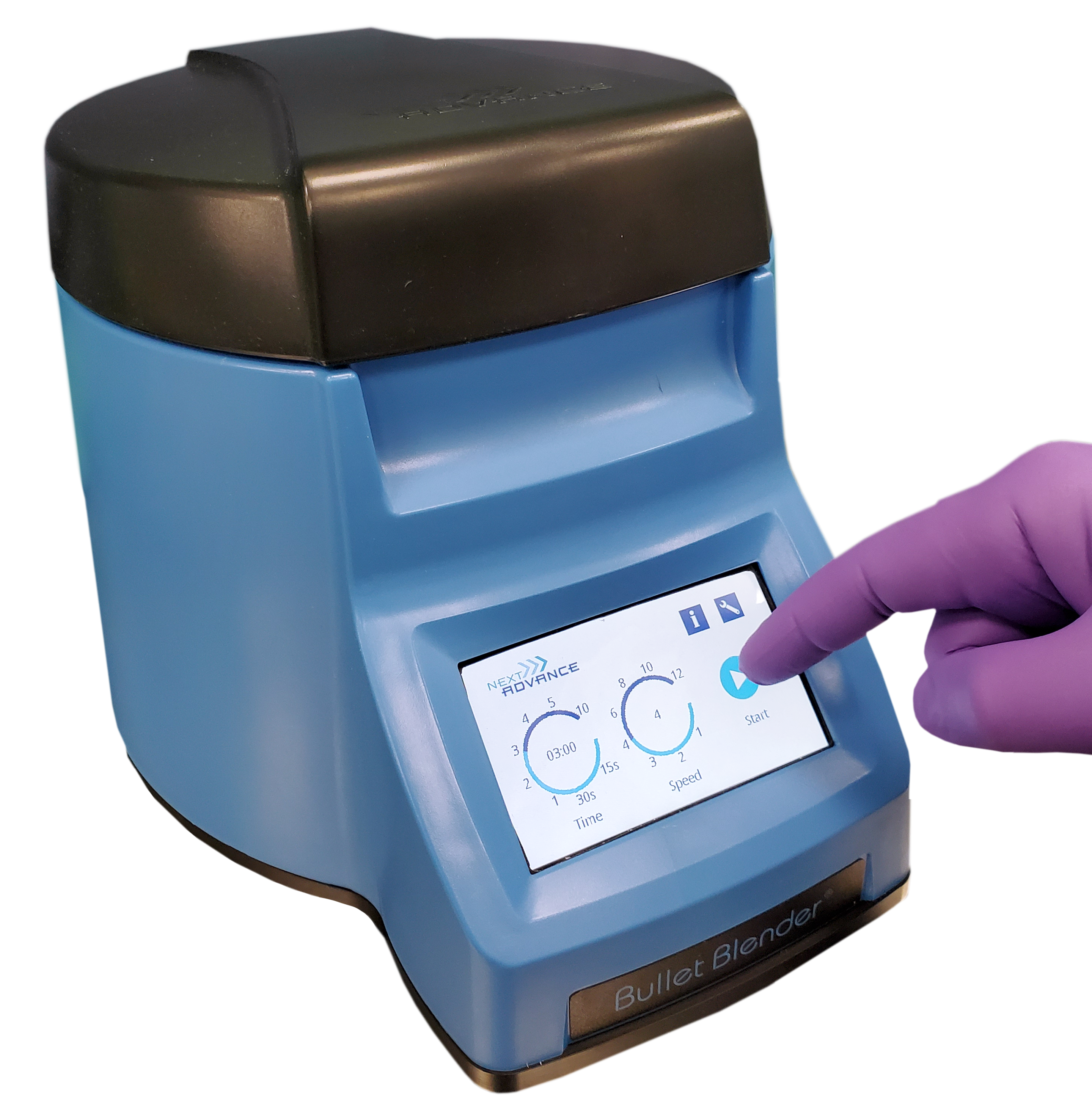
Want more guidance? Need a quote? Contact us:
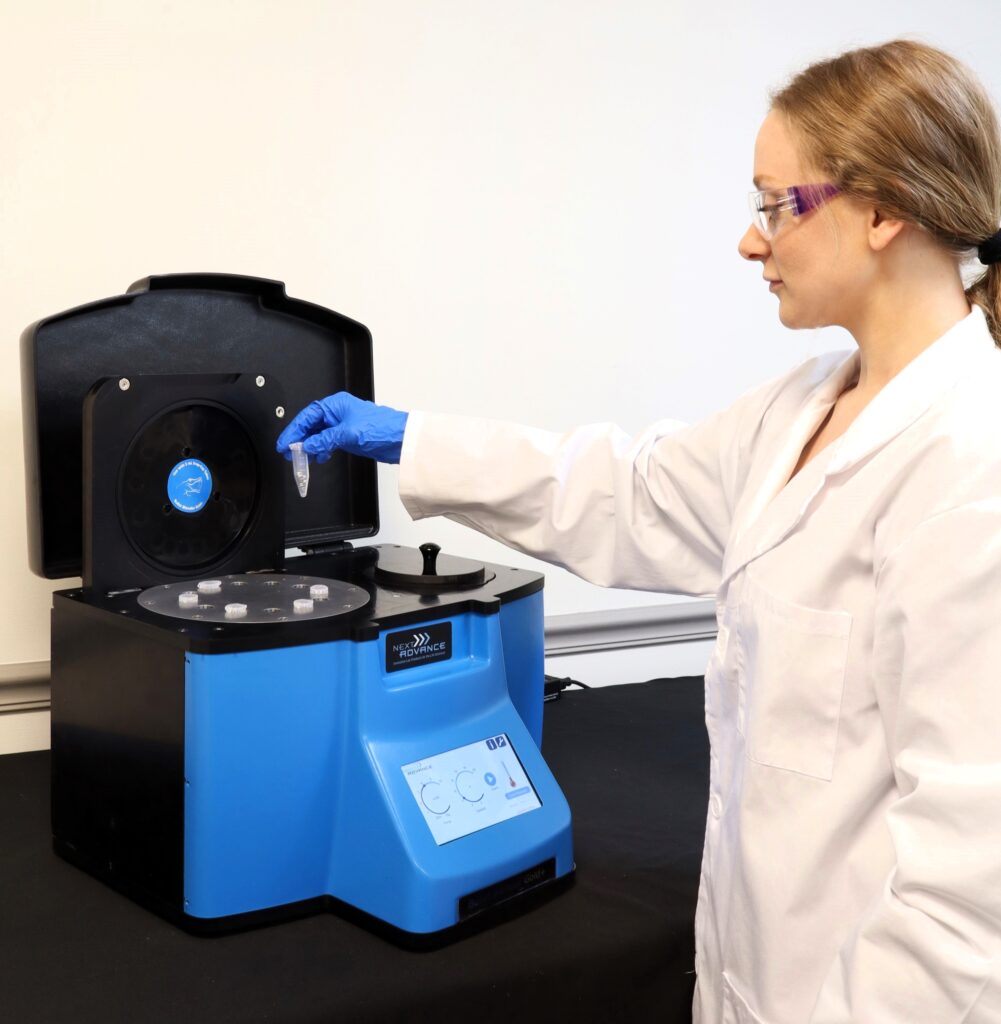
Bullet Blender Models
Select Publications using the Bullet Blender to Homogenize Bladder Tissue
2474232
bladder
1
apa
50
date
desc
3090
https://www.nextadvance.com/wp-content/plugins/zotpress/
%7B%22status%22%3A%22success%22%2C%22updateneeded%22%3Afalse%2C%22instance%22%3Afalse%2C%22meta%22%3A%7B%22request_last%22%3A0%2C%22request_next%22%3A0%2C%22used_cache%22%3Atrue%7D%2C%22data%22%3A%5B%7B%22key%22%3A%22J9FPMR9R%22%2C%22library%22%3A%7B%22id%22%3A2474232%7D%2C%22meta%22%3A%7B%22creatorSummary%22%3A%22Lewis%20et%20al.%22%2C%22parsedDate%22%3A%222016-02-14%22%2C%22numChildren%22%3A2%7D%2C%22bib%22%3A%22%26lt%3Bdiv%20class%3D%26quot%3Bcsl-bib-body%26quot%3B%20style%3D%26quot%3Bline-height%3A%202%3B%20padding-left%3A%201em%3B%20text-indent%3A-1em%3B%26quot%3B%26gt%3B%5Cn%20%20%26lt%3Bdiv%20class%3D%26quot%3Bcsl-entry%26quot%3B%26gt%3BLewis%2C%20A.%20J.%2C%20Dhakal%2C%20B.%20K.%2C%20Liu%2C%20T.%2C%20%26amp%3B%20Mulvey%2C%20M.%20A.%20%282016%29.%20Histone%20Deacetylase%206%20Regulates%20Bladder%20Architecture%20and%20Host%20Susceptibility%20to%20Uropathogenic%20Escherichia%20coli.%20%26lt%3Bi%26gt%3BPathogens%26lt%3B%5C%2Fi%26gt%3B%2C%20%26lt%3Bi%26gt%3B5%26lt%3B%5C%2Fi%26gt%3B%281%29%2C%2020.%20%26lt%3Ba%20class%3D%26%23039%3Bzp-DOIURL%26%23039%3B%20href%3D%26%23039%3Bhttps%3A%5C%2F%5C%2Fdoi.org%5C%2F10.3390%5C%2Fpathogens5010020%26%23039%3B%26gt%3Bhttps%3A%5C%2F%5C%2Fdoi.org%5C%2F10.3390%5C%2Fpathogens5010020%26lt%3B%5C%2Fa%26gt%3B%26lt%3B%5C%2Fdiv%26gt%3B%5Cn%26lt%3B%5C%2Fdiv%26gt%3B%22%2C%22data%22%3A%7B%22itemType%22%3A%22journalArticle%22%2C%22title%22%3A%22Histone%20Deacetylase%206%20Regulates%20Bladder%20Architecture%20and%20Host%20Susceptibility%20to%20Uropathogenic%20Escherichia%20coli%22%2C%22creators%22%3A%5B%7B%22creatorType%22%3A%22author%22%2C%22firstName%22%3A%22Adam%20J.%22%2C%22lastName%22%3A%22Lewis%22%7D%2C%7B%22creatorType%22%3A%22author%22%2C%22firstName%22%3A%22Bijaya%20K.%22%2C%22lastName%22%3A%22Dhakal%22%7D%2C%7B%22creatorType%22%3A%22author%22%2C%22firstName%22%3A%22Ting%22%2C%22lastName%22%3A%22Liu%22%7D%2C%7B%22creatorType%22%3A%22author%22%2C%22firstName%22%3A%22Matthew%20A.%22%2C%22lastName%22%3A%22Mulvey%22%7D%5D%2C%22abstractNote%22%3A%22Histone%20deacetylase%206%20%28HDAC6%29%20is%20a%20non-canonical%2C%20mostly%20cytosolic%20histone%20deacetylase%20that%5Cu00a0has%20a%20variety%20of%20interacting%20partners%20and%20substrates.%20Previous%20work%20using%20cell-culture%20based%20assays%5Cu00a0coupled%20with%20pharmacological%20inhibitors%20and%20gene-silencing%20approaches%20indicated%20that%20HDAC6%5Cu00a0promotes%20the%20actin-%20and%20microtubule-dependent%20invasion%20of%20host%20cells%20by%20uropathogenic%20Escherichia%20coli%20%28UPEC%29.%20These%20facultative%20intracellular%20pathogens%20are%20the%20major%20cause%20of%20urinary%20tract%20infections.%5Cu00a0Here%2C%20we%20examined%20the%20involvement%20of%20HDAC6%20in%20bladder%20colonization%20by%20UPEC%20using%20HDAC6%5Cu00a0knockout%20mice.%20Though%20UPEC%20was%20unable%20to%20invade%20HDAC6%5Cu2212%5C%2F%5Cu2212%20cells%20in%20culture%2C%20the%20bacteria%20had%5Cu00a0an%20enhanced%20ability%20to%20colonize%20the%20bladders%20of%20mice%20that%20lacked%20HDAC6.%20This%20effect%20was%20transient%2C%5Cu00a0and%20by%20six%20hours%20post-inoculation%20bacterial%20titers%20in%20the%20HDAC6%5Cu2212%5C%2F%5Cu2212%20mice%20were%20reduced%20to%20levels%5Cu00a0seen%20in%20wild%20type%20control%20animals.%20Subsequent%20analyses%20revealed%20that%20the%20mutant%20mice%20had%20greater%5Cu00a0bladder%20volume%20capacity%20and%20fluid%20retention%2C%20along%20with%20much%20higher%20levels%20of%20acetylated%20a-tubulin.%5Cu00a0In%20addition%2C%20infiltrating%20neutrophils%20recovered%20from%20the%20HDAC6%5Cu2212%5C%2F%5Cu2212%20bladder%20harbored%20significantly%5Cu00a0more%20viable%20bacteria%20than%20their%20wild%20type%20counterparts.%20Cumulatively%2C%20these%20changes%20may%20negate%20any%5Cu00a0inhibitory%20effects%20that%20the%20lack%20of%20HDAC6%20has%20on%20UPEC%20entry%20into%20individual%20host%20cells%2C%20and%20suggest%5Cu00a0roles%20for%20HDAC6%20in%20other%20urological%20disorders%20such%20as%20urinary%20retention.%22%2C%22date%22%3A%222016-02-14%22%2C%22language%22%3A%22en%22%2C%22DOI%22%3A%2210.3390%5C%2Fpathogens5010020%22%2C%22ISSN%22%3A%22%22%2C%22url%22%3A%22http%3A%5C%2F%5C%2Fwww.mdpi.com%5C%2F2076-0817%5C%2F5%5C%2F1%5C%2F20%22%2C%22collections%22%3A%5B%22M2MNG549%22%5D%2C%22dateModified%22%3A%222016-06-24T17%3A17%3A17Z%22%7D%7D%2C%7B%22key%22%3A%22AE8Z6UCD%22%2C%22library%22%3A%7B%22id%22%3A2474232%7D%2C%22meta%22%3A%7B%22creatorSummary%22%3A%22Rosen%20et%20al.%22%2C%22parsedDate%22%3A%222015-09-07%22%2C%22numChildren%22%3A0%7D%2C%22bib%22%3A%22%26lt%3Bdiv%20class%3D%26quot%3Bcsl-bib-body%26quot%3B%20style%3D%26quot%3Bline-height%3A%202%3B%20padding-left%3A%201em%3B%20text-indent%3A-1em%3B%26quot%3B%26gt%3B%5Cn%20%20%26lt%3Bdiv%20class%3D%26quot%3Bcsl-entry%26quot%3B%26gt%3BRosen%2C%20D.%20A.%2C%20Hilliard%2C%20J.%20K.%2C%20Tiemann%2C%20K.%20M.%2C%20Todd%2C%20E.%20M.%2C%20Morley%2C%20S.%20C.%2C%20%26amp%3B%20Hunstad%2C%20D.%20A.%20%282015%29.%20%26lt%3Bi%26gt%3BKlebsiella%26lt%3B%5C%2Fi%26gt%3B%20%26lt%3Bi%26gt%3Bpneumoniae%26lt%3B%5C%2Fi%26gt%3B%20FimK%20Promotes%20Virulence%20in%20Murine%20Pneumonia.%20%26lt%3Bi%26gt%3BJournal%20of%20Infectious%20Diseases%26lt%3B%5C%2Fi%26gt%3B%2C%20jiv440.%20%26lt%3Ba%20class%3D%26%23039%3Bzp-DOIURL%26%23039%3B%20href%3D%26%23039%3Bhttps%3A%5C%2F%5C%2Fdoi.org%5C%2F10.1093%5C%2Finfdis%5C%2Fjiv440%26%23039%3B%26gt%3Bhttps%3A%5C%2F%5C%2Fdoi.org%5C%2F10.1093%5C%2Finfdis%5C%2Fjiv440%26lt%3B%5C%2Fa%26gt%3B%26lt%3B%5C%2Fdiv%26gt%3B%5Cn%26lt%3B%5C%2Fdiv%26gt%3B%22%2C%22data%22%3A%7B%22itemType%22%3A%22journalArticle%22%2C%22title%22%3A%22%3Ci%3EKlebsiella%3C%5C%2Fi%3E%20%3Ci%3Epneumoniae%3C%5C%2Fi%3E%20FimK%20Promotes%20Virulence%20in%20Murine%20Pneumonia%22%2C%22creators%22%3A%5B%7B%22creatorType%22%3A%22author%22%2C%22firstName%22%3A%22David%20A.%22%2C%22lastName%22%3A%22Rosen%22%7D%2C%7B%22creatorType%22%3A%22author%22%2C%22firstName%22%3A%22Julia%20K.%22%2C%22lastName%22%3A%22Hilliard%22%7D%2C%7B%22creatorType%22%3A%22author%22%2C%22firstName%22%3A%22Kristin%20M.%22%2C%22lastName%22%3A%22Tiemann%22%7D%2C%7B%22creatorType%22%3A%22author%22%2C%22firstName%22%3A%22Elizabeth%20M.%22%2C%22lastName%22%3A%22Todd%22%7D%2C%7B%22creatorType%22%3A%22author%22%2C%22firstName%22%3A%22S.%20Celeste%22%2C%22lastName%22%3A%22Morley%22%7D%2C%7B%22creatorType%22%3A%22author%22%2C%22firstName%22%3A%22David%20A.%22%2C%22lastName%22%3A%22Hunstad%22%7D%5D%2C%22abstractNote%22%3A%22%22%2C%22date%22%3A%222015-09-07%22%2C%22language%22%3A%22en%22%2C%22DOI%22%3A%2210.1093%5C%2Finfdis%5C%2Fjiv440%22%2C%22ISSN%22%3A%220022-1899%2C%201537-6613%22%2C%22url%22%3A%22http%3A%5C%2F%5C%2Fjid.oxfordjournals.org%5C%2Flookup%5C%2Fdoi%5C%2F10.1093%5C%2Finfdis%5C%2Fjiv440%22%2C%22collections%22%3A%5B%22M2MNG549%22%5D%2C%22dateModified%22%3A%222015-12-30T17%3A05%3A32Z%22%7D%7D%2C%7B%22key%22%3A%2232P8ZSZW%22%2C%22library%22%3A%7B%22id%22%3A2474232%7D%2C%22meta%22%3A%7B%22creatorSummary%22%3A%22Danka%20and%20Hunstad%22%2C%22parsedDate%22%3A%222015-04-01%22%2C%22numChildren%22%3A0%7D%2C%22bib%22%3A%22%26lt%3Bdiv%20class%3D%26quot%3Bcsl-bib-body%26quot%3B%20style%3D%26quot%3Bline-height%3A%202%3B%20padding-left%3A%201em%3B%20text-indent%3A-1em%3B%26quot%3B%26gt%3B%5Cn%20%20%26lt%3Bdiv%20class%3D%26quot%3Bcsl-entry%26quot%3B%26gt%3BDanka%2C%20E.%20S.%2C%20%26amp%3B%20Hunstad%2C%20D.%20A.%20%282015%29.%20Cathelicidin%20Augments%20Epithelial%20Receptivity%20and%20Pathogenesis%20in%20Experimental%20Escherichia%20coli%20Cystitis.%20%26lt%3Bi%26gt%3BJournal%20of%20Infectious%20Diseases%26lt%3B%5C%2Fi%26gt%3B%2C%20%26lt%3Bi%26gt%3B211%26lt%3B%5C%2Fi%26gt%3B%287%29%2C%201164%26%23x2013%3B1173.%20%26lt%3Ba%20class%3D%26%23039%3Bzp-DOIURL%26%23039%3B%20href%3D%26%23039%3Bhttps%3A%5C%2F%5C%2Fdoi.org%5C%2F10.1093%5C%2Finfdis%5C%2Fjiu577%26%23039%3B%26gt%3Bhttps%3A%5C%2F%5C%2Fdoi.org%5C%2F10.1093%5C%2Finfdis%5C%2Fjiu577%26lt%3B%5C%2Fa%26gt%3B%26lt%3B%5C%2Fdiv%26gt%3B%5Cn%26lt%3B%5C%2Fdiv%26gt%3B%22%2C%22data%22%3A%7B%22itemType%22%3A%22journalArticle%22%2C%22title%22%3A%22Cathelicidin%20Augments%20Epithelial%20Receptivity%20and%20Pathogenesis%20in%20Experimental%20Escherichia%20coli%20Cystitis%22%2C%22creators%22%3A%5B%7B%22creatorType%22%3A%22author%22%2C%22firstName%22%3A%22E.%20S.%22%2C%22lastName%22%3A%22Danka%22%7D%2C%7B%22creatorType%22%3A%22author%22%2C%22firstName%22%3A%22D.%20A.%22%2C%22lastName%22%3A%22Hunstad%22%7D%5D%2C%22abstractNote%22%3A%22%22%2C%22date%22%3A%222015-04-01%22%2C%22language%22%3A%22en%22%2C%22DOI%22%3A%2210.1093%5C%2Finfdis%5C%2Fjiu577%22%2C%22ISSN%22%3A%220022-1899%2C%201537-6613%22%2C%22url%22%3A%22http%3A%5C%2F%5C%2Fjid.oxfordjournals.org%5C%2Flookup%5C%2Fdoi%5C%2F10.1093%5C%2Finfdis%5C%2Fjiu577%22%2C%22collections%22%3A%5B%22M2MNG549%22%5D%2C%22dateModified%22%3A%222015-08-03T15%3A45%3A26Z%22%7D%7D%2C%7B%22key%22%3A%22EDUNUG27%22%2C%22library%22%3A%7B%22id%22%3A2474232%7D%2C%22meta%22%3A%7B%22creatorSummary%22%3A%22Wagers%20et%20al.%22%2C%22parsedDate%22%3A%222015%22%2C%22numChildren%22%3A0%7D%2C%22bib%22%3A%22%26lt%3Bdiv%20class%3D%26quot%3Bcsl-bib-body%26quot%3B%20style%3D%26quot%3Bline-height%3A%202%3B%20padding-left%3A%201em%3B%20text-indent%3A-1em%3B%26quot%3B%26gt%3B%5Cn%20%20%26lt%3Bdiv%20class%3D%26quot%3Bcsl-entry%26quot%3B%26gt%3BWagers%2C%20P.%20O.%2C%20Tiemann%2C%20K.%20M.%2C%20Shelton%2C%20K.%20L.%2C%20Kofron%2C%20W.%20G.%2C%20Panzner%2C%20M.%20J.%2C%20Wooley%2C%20K.%20L.%2C%20Youngs%2C%20W.%20J.%2C%20%26amp%3B%20Hunstad%2C%20D.%20A.%20%282015%29.%20Imidazolium%20Salts%20as%20Small-Molecule%20Urinary%20Bladder%20Exfoliants%20in%20a%20Murine%20Model.%20%26lt%3Bi%26gt%3BAntimicrobial%20Agents%20and%20Chemotherapy%26lt%3B%5C%2Fi%26gt%3B%2C%20%26lt%3Bi%26gt%3B59%26lt%3B%5C%2Fi%26gt%3B%289%29%2C%205494%26%23x2013%3B5502.%20%26lt%3Ba%20class%3D%26%23039%3Bzp-DOIURL%26%23039%3B%20href%3D%26%23039%3Bhttps%3A%5C%2F%5C%2Fdoi.org%5C%2F10.1128%5C%2FAAC.00881-15%26%23039%3B%26gt%3Bhttps%3A%5C%2F%5C%2Fdoi.org%5C%2F10.1128%5C%2FAAC.00881-15%26lt%3B%5C%2Fa%26gt%3B%26lt%3B%5C%2Fdiv%26gt%3B%5Cn%26lt%3B%5C%2Fdiv%26gt%3B%22%2C%22data%22%3A%7B%22itemType%22%3A%22journalArticle%22%2C%22title%22%3A%22Imidazolium%20Salts%20as%20Small-Molecule%20Urinary%20Bladder%20Exfoliants%20in%20a%20Murine%20Model%22%2C%22creators%22%3A%5B%7B%22creatorType%22%3A%22author%22%2C%22firstName%22%3A%22Patrick%20O.%22%2C%22lastName%22%3A%22Wagers%22%7D%2C%7B%22creatorType%22%3A%22author%22%2C%22firstName%22%3A%22Kristin%20M.%22%2C%22lastName%22%3A%22Tiemann%22%7D%2C%7B%22creatorType%22%3A%22author%22%2C%22firstName%22%3A%22Kerri%20L.%22%2C%22lastName%22%3A%22Shelton%22%7D%2C%7B%22creatorType%22%3A%22author%22%2C%22firstName%22%3A%22William%20G.%22%2C%22lastName%22%3A%22Kofron%22%7D%2C%7B%22creatorType%22%3A%22author%22%2C%22firstName%22%3A%22Matthew%20J.%22%2C%22lastName%22%3A%22Panzner%22%7D%2C%7B%22creatorType%22%3A%22author%22%2C%22firstName%22%3A%22Karen%20L.%22%2C%22lastName%22%3A%22Wooley%22%7D%2C%7B%22creatorType%22%3A%22author%22%2C%22firstName%22%3A%22Wiley%20J.%22%2C%22lastName%22%3A%22Youngs%22%7D%2C%7B%22creatorType%22%3A%22author%22%2C%22firstName%22%3A%22David%20A.%22%2C%22lastName%22%3A%22Hunstad%22%7D%5D%2C%22abstractNote%22%3A%22%22%2C%22date%22%3A%2209%5C%2F2015%22%2C%22language%22%3A%22en%22%2C%22DOI%22%3A%2210.1128%5C%2FAAC.00881-15%22%2C%22ISSN%22%3A%220066-4804%2C%201098-6596%22%2C%22url%22%3A%22http%3A%5C%2F%5C%2Faac.asm.org%5C%2Flookup%5C%2Fdoi%5C%2F10.1128%5C%2FAAC.00881-15%22%2C%22collections%22%3A%5B%22M2MNG549%22%5D%2C%22dateModified%22%3A%222015-08-17T18%3A24%3A06Z%22%7D%7D%2C%7B%22key%22%3A%22RKN8T7IC%22%2C%22library%22%3A%7B%22id%22%3A2474232%7D%2C%22meta%22%3A%7B%22creatorSummary%22%3A%22Jiang%22%2C%22parsedDate%22%3A%222015%22%2C%22numChildren%22%3A0%7D%2C%22bib%22%3A%22%26lt%3Bdiv%20class%3D%26quot%3Bcsl-bib-body%26quot%3B%20style%3D%26quot%3Bline-height%3A%202%3B%20padding-left%3A%201em%3B%20text-indent%3A-1em%3B%26quot%3B%26gt%3B%5Cn%20%20%26lt%3Bdiv%20class%3D%26quot%3Bcsl-entry%26quot%3B%26gt%3BJiang%2C%20J.-X.%20%282015%29.%20%26lt%3Bi%26gt%3BDNA%20Methylation%20Machinery%20Mediates%26%23xA0%3B%20the%20Bladder%26%23x2019%3Bs%20Response%20to%20Obstruction%26lt%3B%5C%2Fi%26gt%3B%20%5BUniversity%20of%20Toronto%5D.%20%26lt%3Ba%20class%3D%26%23039%3Bzp-ItemURL%26%23039%3B%20href%3D%26%23039%3Bhttps%3A%5C%2F%5C%2Ftspace.library.utoronto.ca%5C%2Fbitstream%5C%2F1807%5C%2F69649%5C%2F1%5C%2FJiang_Jia_Xin_201506_MSc_thesis.pdf%26%23039%3B%26gt%3Bhttps%3A%5C%2F%5C%2Ftspace.library.utoronto.ca%5C%2Fbitstream%5C%2F1807%5C%2F69649%5C%2F1%5C%2FJiang_Jia_Xin_201506_MSc_thesis.pdf%26lt%3B%5C%2Fa%26gt%3B%26lt%3B%5C%2Fdiv%26gt%3B%5Cn%26lt%3B%5C%2Fdiv%26gt%3B%22%2C%22data%22%3A%7B%22itemType%22%3A%22thesis%22%2C%22title%22%3A%22DNA%20Methylation%20Machinery%20Mediates%20%20the%20Bladder%5Cu2019s%20Response%20to%20Obstruction%22%2C%22creators%22%3A%5B%7B%22creatorType%22%3A%22author%22%2C%22firstName%22%3A%22Jia-Xin%22%2C%22lastName%22%3A%22Jiang%22%7D%5D%2C%22abstractNote%22%3A%22%22%2C%22thesisType%22%3A%22%22%2C%22university%22%3A%22University%20of%20Toronto%22%2C%22date%22%3A%222015%22%2C%22language%22%3A%22%22%2C%22url%22%3A%22https%3A%5C%2F%5C%2Ftspace.library.utoronto.ca%5C%2Fbitstream%5C%2F1807%5C%2F69649%5C%2F1%5C%2FJiang_Jia_Xin_201506_MSc_thesis.pdf%22%2C%22collections%22%3A%5B%22M2MNG549%22%5D%2C%22dateModified%22%3A%222016-01-11T21%3A07%3A34Z%22%7D%7D%2C%7B%22key%22%3A%22MRA4WZ2E%22%2C%22library%22%3A%7B%22id%22%3A2474232%7D%2C%22meta%22%3A%7B%22creatorSummary%22%3A%22Wang%20et%20al.%22%2C%22parsedDate%22%3A%222014-10-01%22%2C%22numChildren%22%3A0%7D%2C%22bib%22%3A%22%26lt%3Bdiv%20class%3D%26quot%3Bcsl-bib-body%26quot%3B%20style%3D%26quot%3Bline-height%3A%202%3B%20padding-left%3A%201em%3B%20text-indent%3A-1em%3B%26quot%3B%26gt%3B%5Cn%20%20%26lt%3Bdiv%20class%3D%26quot%3Bcsl-entry%26quot%3B%26gt%3BWang%2C%20J.-H.%2C%20Singh%2C%20R.%2C%20Benoit%2C%20M.%2C%20Keyhan%2C%20M.%2C%20Sylvester%2C%20M.%2C%20Hsieh%2C%20M.%2C%20Thathireddy%2C%20A.%2C%20Hsieh%2C%20Y.-J.%2C%20%26amp%3B%20Matin%2C%20A.%20C.%20%282014%29.%20Sigma%20S-Dependent%20Antioxidant%20Defense%20Protects%20Stationary-Phase%20Escherichia%20coli%20against%20the%20Bactericidal%20Antibiotic%20Gentamicin.%20%26lt%3Bi%26gt%3BAntimicrobial%20Agents%20and%20Chemotherapy%26lt%3B%5C%2Fi%26gt%3B%2C%20%26lt%3Bi%26gt%3B58%26lt%3B%5C%2Fi%26gt%3B%2810%29%2C%205964%26%23x2013%3B5975.%20%26lt%3Ba%20class%3D%26%23039%3Bzp-DOIURL%26%23039%3B%20href%3D%26%23039%3Bhttps%3A%5C%2F%5C%2Fdoi.org%5C%2F10.1128%5C%2FAAC.03683-14%26%23039%3B%26gt%3Bhttps%3A%5C%2F%5C%2Fdoi.org%5C%2F10.1128%5C%2FAAC.03683-14%26lt%3B%5C%2Fa%26gt%3B%26lt%3B%5C%2Fdiv%26gt%3B%5Cn%26lt%3B%5C%2Fdiv%26gt%3B%22%2C%22data%22%3A%7B%22itemType%22%3A%22journalArticle%22%2C%22title%22%3A%22Sigma%20S-Dependent%20Antioxidant%20Defense%20Protects%20Stationary-Phase%20Escherichia%20coli%20against%20the%20Bactericidal%20Antibiotic%20Gentamicin%22%2C%22creators%22%3A%5B%7B%22creatorType%22%3A%22author%22%2C%22firstName%22%3A%22J.-H.%22%2C%22lastName%22%3A%22Wang%22%7D%2C%7B%22creatorType%22%3A%22author%22%2C%22firstName%22%3A%22R.%22%2C%22lastName%22%3A%22Singh%22%7D%2C%7B%22creatorType%22%3A%22author%22%2C%22firstName%22%3A%22M.%22%2C%22lastName%22%3A%22Benoit%22%7D%2C%7B%22creatorType%22%3A%22author%22%2C%22firstName%22%3A%22M.%22%2C%22lastName%22%3A%22Keyhan%22%7D%2C%7B%22creatorType%22%3A%22author%22%2C%22firstName%22%3A%22M.%22%2C%22lastName%22%3A%22Sylvester%22%7D%2C%7B%22creatorType%22%3A%22author%22%2C%22firstName%22%3A%22M.%22%2C%22lastName%22%3A%22Hsieh%22%7D%2C%7B%22creatorType%22%3A%22author%22%2C%22firstName%22%3A%22A.%22%2C%22lastName%22%3A%22Thathireddy%22%7D%2C%7B%22creatorType%22%3A%22author%22%2C%22firstName%22%3A%22Y.-J.%22%2C%22lastName%22%3A%22Hsieh%22%7D%2C%7B%22creatorType%22%3A%22author%22%2C%22firstName%22%3A%22A.%20C.%22%2C%22lastName%22%3A%22Matin%22%7D%5D%2C%22abstractNote%22%3A%22%22%2C%22date%22%3A%222014-10-01%22%2C%22language%22%3A%22en%22%2C%22DOI%22%3A%2210.1128%5C%2FAAC.03683-14%22%2C%22ISSN%22%3A%220066-4804%2C%201098-6596%22%2C%22url%22%3A%22http%3A%5C%2F%5C%2Faac.asm.org%5C%2Fcgi%5C%2Fdoi%5C%2F10.1128%5C%2FAAC.03683-14%22%2C%22collections%22%3A%5B%22M2MNG549%22%5D%2C%22dateModified%22%3A%222015-08-12T17%3A27%3A45Z%22%7D%7D%2C%7B%22key%22%3A%22CG63U65K%22%2C%22library%22%3A%7B%22id%22%3A2474232%7D%2C%22meta%22%3A%7B%22creatorSummary%22%3A%22Melero%20et%20al.%22%2C%22parsedDate%22%3A%222014%22%2C%22numChildren%22%3A0%7D%2C%22bib%22%3A%22%26lt%3Bdiv%20class%3D%26quot%3Bcsl-bib-body%26quot%3B%20style%3D%26quot%3Bline-height%3A%202%3B%20padding-left%3A%201em%3B%20text-indent%3A-1em%3B%26quot%3B%26gt%3B%5Cn%20%20%26lt%3Bdiv%20class%3D%26quot%3Bcsl-entry%26quot%3B%26gt%3BMelero%2C%20M.%2C%20Garc%26%23xED%3Ba-P%26%23xE1%3Brraga%2C%20D.%2C%20Corpa%2C%20J.%2C%20Ortega%2C%20J.%2C%20Rubio-Guerri%2C%20C.%2C%20Crespo%2C%20J.%2C%20Rivera-Arroyo%2C%20B.%2C%20%26amp%3B%20S%26%23xE1%3Bnchez-Vizca%26%23xED%3Bno%2C%20J.%20%282014%29.%20First%20molecular%20detection%20and%20characterization%20of%20herpesvirus%20and%20poxvirus%20in%20a%20Pacific%20walrus%20%28Odobenus%20rosmarus%20divergens%29.%20%26lt%3Bi%26gt%3BBMC%20Veterinary%20Research%26lt%3B%5C%2Fi%26gt%3B%2C%20%26lt%3Bi%26gt%3B10%26lt%3B%5C%2Fi%26gt%3B%281%29%2C%20968.%20%26lt%3Ba%20class%3D%26%23039%3Bzp-DOIURL%26%23039%3B%20href%3D%26%23039%3Bhttps%3A%5C%2F%5C%2Fdoi.org%5C%2F10.1186%5C%2Fs12917-014-0308-2%26%23039%3B%26gt%3Bhttps%3A%5C%2F%5C%2Fdoi.org%5C%2F10.1186%5C%2Fs12917-014-0308-2%26lt%3B%5C%2Fa%26gt%3B%26lt%3B%5C%2Fdiv%26gt%3B%5Cn%26lt%3B%5C%2Fdiv%26gt%3B%22%2C%22data%22%3A%7B%22itemType%22%3A%22journalArticle%22%2C%22title%22%3A%22First%20molecular%20detection%20and%20characterization%20of%20herpesvirus%20and%20poxvirus%20in%20a%20Pacific%20walrus%20%28Odobenus%20rosmarus%20divergens%29%22%2C%22creators%22%3A%5B%7B%22creatorType%22%3A%22author%22%2C%22firstName%22%3A%22Mar%22%2C%22lastName%22%3A%22Melero%22%7D%2C%7B%22creatorType%22%3A%22author%22%2C%22firstName%22%3A%22Daniel%22%2C%22lastName%22%3A%22Garc%5Cu00eda-P%5Cu00e1rraga%22%7D%2C%7B%22creatorType%22%3A%22author%22%2C%22firstName%22%3A%22Juan%22%2C%22lastName%22%3A%22Corpa%22%7D%2C%7B%22creatorType%22%3A%22author%22%2C%22firstName%22%3A%22Joaqu%5Cu00edn%22%2C%22lastName%22%3A%22Ortega%22%7D%2C%7B%22creatorType%22%3A%22author%22%2C%22firstName%22%3A%22Consuelo%22%2C%22lastName%22%3A%22Rubio-Guerri%22%7D%2C%7B%22creatorType%22%3A%22author%22%2C%22firstName%22%3A%22Jos%5Cu00e9%22%2C%22lastName%22%3A%22Crespo%22%7D%2C%7B%22creatorType%22%3A%22author%22%2C%22firstName%22%3A%22Bel%5Cu00e9n%22%2C%22lastName%22%3A%22Rivera-Arroyo%22%7D%2C%7B%22creatorType%22%3A%22author%22%2C%22firstName%22%3A%22Jos%5Cu00e9%22%2C%22lastName%22%3A%22S%5Cu00e1nchez-Vizca%5Cu00edno%22%7D%5D%2C%22abstractNote%22%3A%22%22%2C%22date%22%3A%222014%22%2C%22language%22%3A%22en%22%2C%22DOI%22%3A%2210.1186%5C%2Fs12917-014-0308-2%22%2C%22ISSN%22%3A%221746-6148%22%2C%22url%22%3A%22http%3A%5C%2F%5C%2Fwww.biomedcentral.com%5C%2F1746-6148%5C%2F10%5C%2F968%22%2C%22collections%22%3A%5B%22M2MNG549%22%5D%2C%22dateModified%22%3A%222016-01-12T17%3A25%3A07Z%22%7D%7D%2C%7B%22key%22%3A%22QNPPN824%22%2C%22library%22%3A%7B%22id%22%3A2474232%7D%2C%22meta%22%3A%7B%22creatorSummary%22%3A%22Becknell%20et%20al.%22%2C%22parsedDate%22%3A%222013-10-21%22%2C%22numChildren%22%3A0%7D%2C%22bib%22%3A%22%26lt%3Bdiv%20class%3D%26quot%3Bcsl-bib-body%26quot%3B%20style%3D%26quot%3Bline-height%3A%202%3B%20padding-left%3A%201em%3B%20text-indent%3A-1em%3B%26quot%3B%26gt%3B%5Cn%20%20%26lt%3Bdiv%20class%3D%26quot%3Bcsl-entry%26quot%3B%26gt%3BBecknell%2C%20B.%2C%20Spencer%2C%20J.%20D.%2C%20Carpenter%2C%20A.%20R.%2C%20Chen%2C%20X.%2C%20Singh%2C%20A.%2C%20Ploeger%2C%20S.%2C%20Kline%2C%20J.%2C%20Ellsworth%2C%20P.%2C%20Li%2C%20B.%2C%20Proksch%2C%20E.%2C%20Schwaderer%2C%20A.%20L.%2C%20Hains%2C%20D.%20S.%2C%20Justice%2C%20S.%20S.%2C%20%26amp%3B%20McHugh%2C%20K.%20M.%20%282013%29.%20Expression%20and%20Antimicrobial%20Function%20of%20Beta-Defensin%201%20in%20the%20Lower%20Urinary%20Tract.%20%26lt%3Bi%26gt%3BPLoS%20ONE%26lt%3B%5C%2Fi%26gt%3B%2C%20%26lt%3Bi%26gt%3B8%26lt%3B%5C%2Fi%26gt%3B%2810%29%2C%20e77714.%20%26lt%3Ba%20class%3D%26%23039%3Bzp-DOIURL%26%23039%3B%20href%3D%26%23039%3Bhttps%3A%5C%2F%5C%2Fdoi.org%5C%2F10.1371%5C%2Fjournal.pone.0077714%26%23039%3B%26gt%3Bhttps%3A%5C%2F%5C%2Fdoi.org%5C%2F10.1371%5C%2Fjournal.pone.0077714%26lt%3B%5C%2Fa%26gt%3B%26lt%3B%5C%2Fdiv%26gt%3B%5Cn%26lt%3B%5C%2Fdiv%26gt%3B%22%2C%22data%22%3A%7B%22itemType%22%3A%22journalArticle%22%2C%22title%22%3A%22Expression%20and%20Antimicrobial%20Function%20of%20Beta-Defensin%201%20in%20the%20Lower%20Urinary%20Tract%22%2C%22creators%22%3A%5B%7B%22creatorType%22%3A%22author%22%2C%22firstName%22%3A%22Brian%22%2C%22lastName%22%3A%22Becknell%22%7D%2C%7B%22creatorType%22%3A%22author%22%2C%22firstName%22%3A%22John%20David%22%2C%22lastName%22%3A%22Spencer%22%7D%2C%7B%22creatorType%22%3A%22author%22%2C%22firstName%22%3A%22Ashley%20R.%22%2C%22lastName%22%3A%22Carpenter%22%7D%2C%7B%22creatorType%22%3A%22author%22%2C%22firstName%22%3A%22Xi%22%2C%22lastName%22%3A%22Chen%22%7D%2C%7B%22creatorType%22%3A%22author%22%2C%22firstName%22%3A%22Aspinder%22%2C%22lastName%22%3A%22Singh%22%7D%2C%7B%22creatorType%22%3A%22author%22%2C%22firstName%22%3A%22Suzanne%22%2C%22lastName%22%3A%22Ploeger%22%7D%2C%7B%22creatorType%22%3A%22author%22%2C%22firstName%22%3A%22Jennifer%22%2C%22lastName%22%3A%22Kline%22%7D%2C%7B%22creatorType%22%3A%22author%22%2C%22firstName%22%3A%22Patrick%22%2C%22lastName%22%3A%22Ellsworth%22%7D%2C%7B%22creatorType%22%3A%22author%22%2C%22firstName%22%3A%22Birong%22%2C%22lastName%22%3A%22Li%22%7D%2C%7B%22creatorType%22%3A%22author%22%2C%22firstName%22%3A%22Ehrhardt%22%2C%22lastName%22%3A%22Proksch%22%7D%2C%7B%22creatorType%22%3A%22author%22%2C%22firstName%22%3A%22Andrew%20L.%22%2C%22lastName%22%3A%22Schwaderer%22%7D%2C%7B%22creatorType%22%3A%22author%22%2C%22firstName%22%3A%22David%20S.%22%2C%22lastName%22%3A%22Hains%22%7D%2C%7B%22creatorType%22%3A%22author%22%2C%22firstName%22%3A%22Sheryl%20S.%22%2C%22lastName%22%3A%22Justice%22%7D%2C%7B%22creatorType%22%3A%22author%22%2C%22firstName%22%3A%22Kirk%20M.%22%2C%22lastName%22%3A%22McHugh%22%7D%2C%7B%22creatorType%22%3A%22editor%22%2C%22firstName%22%3A%22Olivier%22%2C%22lastName%22%3A%22Neyrolles%22%7D%5D%2C%22abstractNote%22%3A%22%22%2C%22date%22%3A%222013-10-21%22%2C%22language%22%3A%22en%22%2C%22DOI%22%3A%2210.1371%5C%2Fjournal.pone.0077714%22%2C%22ISSN%22%3A%221932-6203%22%2C%22url%22%3A%22http%3A%5C%2F%5C%2Fdx.plos.org%5C%2F10.1371%5C%2Fjournal.pone.0077714%22%2C%22collections%22%3A%5B%22M2MNG549%22%5D%2C%22dateModified%22%3A%222015-07-20T15%3A44%3A53Z%22%7D%7D%2C%7B%22key%22%3A%22PXFJZFQD%22%2C%22library%22%3A%7B%22id%22%3A2474232%7D%2C%22meta%22%3A%7B%22creatorSummary%22%3A%22Schr%5Cu00f6der%20et%20al.%22%2C%22parsedDate%22%3A%222013%22%2C%22numChildren%22%3A0%7D%2C%22bib%22%3A%22%26lt%3Bdiv%20class%3D%26quot%3Bcsl-bib-body%26quot%3B%20style%3D%26quot%3Bline-height%3A%202%3B%20padding-left%3A%201em%3B%20text-indent%3A-1em%3B%26quot%3B%26gt%3B%5Cn%20%20%26lt%3Bdiv%20class%3D%26quot%3Bcsl-entry%26quot%3B%26gt%3BSchr%26%23xF6%3Bder%2C%20A.%2C%20Kirwan%2C%20T.%20P.%2C%20Jiang%2C%20J.-X.%2C%20Aitken%2C%20K.%20J.%2C%20%26amp%3B%20B%26%23xE4%3Bgli%2C%20D.%20J.%20%282013%29.%20Rapamycin%20Attenuates%20Bladder%20Hypertrophy%20During%20Long-Term%20Outlet%20Obstruction%20In%20Vivo%3A%20Tissue%2C%20Matrix%20and%20Mechanistic%20Insights.%20%26lt%3Bi%26gt%3BThe%20Journal%20of%20Urology%26lt%3B%5C%2Fi%26gt%3B%2C%20%26lt%3Bi%26gt%3B189%26lt%3B%5C%2Fi%26gt%3B%286%29%2C%202377%26%23x2013%3B2384.%20%26lt%3Ba%20class%3D%26%23039%3Bzp-DOIURL%26%23039%3B%20href%3D%26%23039%3Bhttps%3A%5C%2F%5C%2Fdoi.org%5C%2F10.1016%5C%2Fj.juro.2012.12.110%26%23039%3B%26gt%3Bhttps%3A%5C%2F%5C%2Fdoi.org%5C%2F10.1016%5C%2Fj.juro.2012.12.110%26lt%3B%5C%2Fa%26gt%3B%26lt%3B%5C%2Fdiv%26gt%3B%5Cn%26lt%3B%5C%2Fdiv%26gt%3B%22%2C%22data%22%3A%7B%22itemType%22%3A%22journalArticle%22%2C%22title%22%3A%22Rapamycin%20Attenuates%20Bladder%20Hypertrophy%20During%20Long-Term%20Outlet%20Obstruction%20In%20Vivo%3A%20Tissue%2C%20Matrix%20and%20Mechanistic%20Insights%22%2C%22creators%22%3A%5B%7B%22creatorType%22%3A%22author%22%2C%22firstName%22%3A%22Annette%22%2C%22lastName%22%3A%22Schr%5Cu00f6der%22%7D%2C%7B%22creatorType%22%3A%22author%22%2C%22firstName%22%3A%22Tyler%20P.%22%2C%22lastName%22%3A%22Kirwan%22%7D%2C%7B%22creatorType%22%3A%22author%22%2C%22firstName%22%3A%22Jia-Xin%22%2C%22lastName%22%3A%22Jiang%22%7D%2C%7B%22creatorType%22%3A%22author%22%2C%22firstName%22%3A%22Karen%20J.%22%2C%22lastName%22%3A%22Aitken%22%7D%2C%7B%22creatorType%22%3A%22author%22%2C%22firstName%22%3A%22Darius%20J.%22%2C%22lastName%22%3A%22B%5Cu00e4gli%22%7D%5D%2C%22abstractNote%22%3A%22%22%2C%22date%22%3A%226%5C%2F2013%22%2C%22language%22%3A%22en%22%2C%22DOI%22%3A%2210.1016%5C%2Fj.juro.2012.12.110%22%2C%22ISSN%22%3A%2200225347%22%2C%22url%22%3A%22http%3A%5C%2F%5C%2Flinkinghub.elsevier.com%5C%2Fretrieve%5C%2Fpii%5C%2FS0022534713000128%22%2C%22collections%22%3A%5B%22M2MNG549%22%5D%2C%22dateModified%22%3A%222015-07-22T14%3A47%3A33Z%22%7D%7D%2C%7B%22key%22%3A%22TC63ICA3%22%2C%22library%22%3A%7B%22id%22%3A2474232%7D%2C%22meta%22%3A%7B%22creatorSummary%22%3A%22Rubio-Guerri%20et%20al.%22%2C%22parsedDate%22%3A%222013%22%2C%22numChildren%22%3A0%7D%2C%22bib%22%3A%22%26lt%3Bdiv%20class%3D%26quot%3Bcsl-bib-body%26quot%3B%20style%3D%26quot%3Bline-height%3A%202%3B%20padding-left%3A%201em%3B%20text-indent%3A-1em%3B%26quot%3B%26gt%3B%5Cn%20%20%26lt%3Bdiv%20class%3D%26quot%3Bcsl-entry%26quot%3B%26gt%3BRubio-Guerri%2C%20C.%2C%20Melero%2C%20M.%2C%20Esper%26%23xF3%3Bn%2C%20F.%2C%20Belli%26%23xE8%3Bre%2C%20E.%2C%20Arbelo%2C%20M.%2C%20Crespo%2C%20J.%2C%20Sierra%2C%20E.%2C%20Garc%26%23xED%3Ba-P%26%23xE1%3Brraga%2C%20D.%2C%20%26amp%3B%20S%26%23xE1%3Bnchez-Vizca%26%23xED%3Bno%2C%20J.%20%282013%29.%20Unusual%20striped%20dolphin%20mass%20mortality%20episode%20related%20to%20cetacean%20morbillivirus%20in%20the%20Spanish%20Mediterranean%20sea.%20%26lt%3Bi%26gt%3BBMC%20Veterinary%20Research%26lt%3B%5C%2Fi%26gt%3B%2C%20%26lt%3Bi%26gt%3B9%26lt%3B%5C%2Fi%26gt%3B%281%29%2C%20106.%20%26lt%3Ba%20class%3D%26%23039%3Bzp-DOIURL%26%23039%3B%20href%3D%26%23039%3Bhttps%3A%5C%2F%5C%2Fdoi.org%5C%2F10.1186%5C%2F1746-6148-9-106%26%23039%3B%26gt%3Bhttps%3A%5C%2F%5C%2Fdoi.org%5C%2F10.1186%5C%2F1746-6148-9-106%26lt%3B%5C%2Fa%26gt%3B%26lt%3B%5C%2Fdiv%26gt%3B%5Cn%26lt%3B%5C%2Fdiv%26gt%3B%22%2C%22data%22%3A%7B%22itemType%22%3A%22journalArticle%22%2C%22title%22%3A%22Unusual%20striped%20dolphin%20mass%20mortality%20episode%20related%20to%20cetacean%20morbillivirus%20in%20the%20Spanish%20Mediterranean%20sea%22%2C%22creators%22%3A%5B%7B%22creatorType%22%3A%22author%22%2C%22firstName%22%3A%22Consuelo%22%2C%22lastName%22%3A%22Rubio-Guerri%22%7D%2C%7B%22creatorType%22%3A%22author%22%2C%22firstName%22%3A%22Mar%22%2C%22lastName%22%3A%22Melero%22%7D%2C%7B%22creatorType%22%3A%22author%22%2C%22firstName%22%3A%22Fernando%22%2C%22lastName%22%3A%22Esper%5Cu00f3n%22%7D%2C%7B%22creatorType%22%3A%22author%22%2C%22firstName%22%3A%22Edwige%22%2C%22lastName%22%3A%22Belli%5Cu00e8re%22%7D%2C%7B%22creatorType%22%3A%22author%22%2C%22firstName%22%3A%22Manuel%22%2C%22lastName%22%3A%22Arbelo%22%7D%2C%7B%22creatorType%22%3A%22author%22%2C%22firstName%22%3A%22Jose%22%2C%22lastName%22%3A%22Crespo%22%7D%2C%7B%22creatorType%22%3A%22author%22%2C%22firstName%22%3A%22Eva%22%2C%22lastName%22%3A%22Sierra%22%7D%2C%7B%22creatorType%22%3A%22author%22%2C%22firstName%22%3A%22Daniel%22%2C%22lastName%22%3A%22Garc%5Cu00eda-P%5Cu00e1rraga%22%7D%2C%7B%22creatorType%22%3A%22author%22%2C%22firstName%22%3A%22Jose%22%2C%22lastName%22%3A%22S%5Cu00e1nchez-Vizca%5Cu00edno%22%7D%5D%2C%22abstractNote%22%3A%22%22%2C%22date%22%3A%222013%22%2C%22language%22%3A%22en%22%2C%22DOI%22%3A%2210.1186%5C%2F1746-6148-9-106%22%2C%22ISSN%22%3A%221746-6148%22%2C%22url%22%3A%22http%3A%5C%2F%5C%2Fwww.biomedcentral.com%5C%2F1746-6148%5C%2F9%5C%2F106%22%2C%22collections%22%3A%5B%22M2MNG549%22%5D%2C%22dateModified%22%3A%222015-07-13T16%3A20%3A42Z%22%7D%7D%2C%7B%22key%22%3A%22UV3JU2QE%22%2C%22library%22%3A%7B%22id%22%3A2474232%7D%2C%22meta%22%3A%7B%22creatorSummary%22%3A%22Hanstein%20et%20al.%22%2C%22parsedDate%22%3A%222013%22%2C%22numChildren%22%3A0%7D%2C%22bib%22%3A%22%26lt%3Bdiv%20class%3D%26quot%3Bcsl-bib-body%26quot%3B%20style%3D%26quot%3Bline-height%3A%202%3B%20padding-left%3A%201em%3B%20text-indent%3A-1em%3B%26quot%3B%26gt%3B%5Cn%20%20%26lt%3Bdiv%20class%3D%26quot%3Bcsl-entry%26quot%3B%26gt%3BHanstein%2C%20R.%2C%20Negoro%2C%20H.%2C%20Patel%2C%20N.%20K.%2C%20Charollais%2C%20A.%2C%20Meda%2C%20P.%2C%20Spray%2C%20D.%20C.%2C%20Suadicani%2C%20S.%20O.%2C%20%26amp%3B%20Scemes%2C%20E.%20%282013%29.%20Promises%20and%20pitfalls%20of%20a%20Pannexin1%20transgenic%20mouse%20line.%20%26lt%3Bi%26gt%3BFrontiers%20in%20Pharmacology%26lt%3B%5C%2Fi%26gt%3B%2C%20%26lt%3Bi%26gt%3B4%26lt%3B%5C%2Fi%26gt%3B.%20%26lt%3Ba%20class%3D%26%23039%3Bzp-DOIURL%26%23039%3B%20href%3D%26%23039%3Bhttps%3A%5C%2F%5C%2Fdoi.org%5C%2F10.3389%5C%2Ffphar.2013.00061%26%23039%3B%26gt%3Bhttps%3A%5C%2F%5C%2Fdoi.org%5C%2F10.3389%5C%2Ffphar.2013.00061%26lt%3B%5C%2Fa%26gt%3B%26lt%3B%5C%2Fdiv%26gt%3B%5Cn%26lt%3B%5C%2Fdiv%26gt%3B%22%2C%22data%22%3A%7B%22itemType%22%3A%22journalArticle%22%2C%22title%22%3A%22Promises%20and%20pitfalls%20of%20a%20Pannexin1%20transgenic%20mouse%20line%22%2C%22creators%22%3A%5B%7B%22creatorType%22%3A%22author%22%2C%22firstName%22%3A%22Regina%22%2C%22lastName%22%3A%22Hanstein%22%7D%2C%7B%22creatorType%22%3A%22author%22%2C%22firstName%22%3A%22Hiromitsu%22%2C%22lastName%22%3A%22Negoro%22%7D%2C%7B%22creatorType%22%3A%22author%22%2C%22firstName%22%3A%22Naman%20K.%22%2C%22lastName%22%3A%22Patel%22%7D%2C%7B%22creatorType%22%3A%22author%22%2C%22firstName%22%3A%22Anne%22%2C%22lastName%22%3A%22Charollais%22%7D%2C%7B%22creatorType%22%3A%22author%22%2C%22firstName%22%3A%22Paolo%22%2C%22lastName%22%3A%22Meda%22%7D%2C%7B%22creatorType%22%3A%22author%22%2C%22firstName%22%3A%22David%20C.%22%2C%22lastName%22%3A%22Spray%22%7D%2C%7B%22creatorType%22%3A%22author%22%2C%22firstName%22%3A%22Sylvia%20O.%22%2C%22lastName%22%3A%22Suadicani%22%7D%2C%7B%22creatorType%22%3A%22author%22%2C%22firstName%22%3A%22Eliana%22%2C%22lastName%22%3A%22Scemes%22%7D%5D%2C%22abstractNote%22%3A%22%22%2C%22date%22%3A%222013%22%2C%22language%22%3A%22%22%2C%22DOI%22%3A%2210.3389%5C%2Ffphar.2013.00061%22%2C%22ISSN%22%3A%221663-9812%22%2C%22url%22%3A%22http%3A%5C%2F%5C%2Fjournal.frontiersin.org%5C%2Farticle%5C%2F10.3389%5C%2Ffphar.2013.00061%5C%2Fabstract%22%2C%22collections%22%3A%5B%22M2MNG549%22%5D%2C%22dateModified%22%3A%222015-07-20T17%3A15%3A36Z%22%7D%7D%2C%7B%22key%22%3A%22SXKW2ZNV%22%2C%22library%22%3A%7B%22id%22%3A2474232%7D%2C%22meta%22%3A%7B%22creatorSummary%22%3A%22Thai%20et%20al.%22%2C%22parsedDate%22%3A%222010-08-05%22%2C%22numChildren%22%3A0%7D%2C%22bib%22%3A%22%26lt%3Bdiv%20class%3D%26quot%3Bcsl-bib-body%26quot%3B%20style%3D%26quot%3Bline-height%3A%202%3B%20padding-left%3A%201em%3B%20text-indent%3A-1em%3B%26quot%3B%26gt%3B%5Cn%20%20%26lt%3Bdiv%20class%3D%26quot%3Bcsl-entry%26quot%3B%26gt%3BThai%2C%20K.%20H.%2C%20Thathireddy%2C%20A.%2C%20%26amp%3B%20Hsieh%2C%20M.%20H.%20%282010%29.%20Transurethral%20Induction%20of%20Mouse%20Urinary%20Tract%20Infection.%20%26lt%3Bi%26gt%3BJournal%20of%20Visualized%20Experiments%26lt%3B%5C%2Fi%26gt%3B%2C%20%26lt%3Bi%26gt%3B42%26lt%3B%5C%2Fi%26gt%3B.%20%26lt%3Ba%20class%3D%26%23039%3Bzp-DOIURL%26%23039%3B%20href%3D%26%23039%3Bhttps%3A%5C%2F%5C%2Fdoi.org%5C%2F10.3791%5C%2F2070%26%23039%3B%26gt%3Bhttps%3A%5C%2F%5C%2Fdoi.org%5C%2F10.3791%5C%2F2070%26lt%3B%5C%2Fa%26gt%3B%26lt%3B%5C%2Fdiv%26gt%3B%5Cn%26lt%3B%5C%2Fdiv%26gt%3B%22%2C%22data%22%3A%7B%22itemType%22%3A%22journalArticle%22%2C%22title%22%3A%22Transurethral%20Induction%20of%20Mouse%20Urinary%20Tract%20Infection%22%2C%22creators%22%3A%5B%7B%22creatorType%22%3A%22author%22%2C%22firstName%22%3A%22Kim%20H.%22%2C%22lastName%22%3A%22Thai%22%7D%2C%7B%22creatorType%22%3A%22author%22%2C%22firstName%22%3A%22Anuradha%22%2C%22lastName%22%3A%22Thathireddy%22%7D%2C%7B%22creatorType%22%3A%22author%22%2C%22firstName%22%3A%22Michael%20H.%22%2C%22lastName%22%3A%22Hsieh%22%7D%5D%2C%22abstractNote%22%3A%22%22%2C%22date%22%3A%222010-8-5%22%2C%22language%22%3A%22en%22%2C%22DOI%22%3A%2210.3791%5C%2F2070%22%2C%22ISSN%22%3A%221940-087X%22%2C%22url%22%3A%22http%3A%5C%2F%5C%2Fwww.jove.com%5C%2Findex%5C%2FDetails.stp%3FID%3D2070%22%2C%22collections%22%3A%5B%22M2MNG549%22%5D%2C%22dateModified%22%3A%222015-07-22T14%3A26%3A35Z%22%7D%7D%5D%7D
Lewis, A. J., Dhakal, B. K., Liu, T., & Mulvey, M. A. (2016). Histone Deacetylase 6 Regulates Bladder Architecture and Host Susceptibility to Uropathogenic Escherichia coli. Pathogens, 5(1), 20. https://doi.org/10.3390/pathogens5010020
Rosen, D. A., Hilliard, J. K., Tiemann, K. M., Todd, E. M., Morley, S. C., & Hunstad, D. A. (2015). Klebsiella pneumoniae FimK Promotes Virulence in Murine Pneumonia. Journal of Infectious Diseases, jiv440. https://doi.org/10.1093/infdis/jiv440
Danka, E. S., & Hunstad, D. A. (2015). Cathelicidin Augments Epithelial Receptivity and Pathogenesis in Experimental Escherichia coli Cystitis. Journal of Infectious Diseases, 211(7), 1164–1173. https://doi.org/10.1093/infdis/jiu577
Wagers, P. O., Tiemann, K. M., Shelton, K. L., Kofron, W. G., Panzner, M. J., Wooley, K. L., Youngs, W. J., & Hunstad, D. A. (2015). Imidazolium Salts as Small-Molecule Urinary Bladder Exfoliants in a Murine Model. Antimicrobial Agents and Chemotherapy, 59(9), 5494–5502. https://doi.org/10.1128/AAC.00881-15
Jiang, J.-X. (2015). DNA Methylation Machinery Mediates the Bladder’s Response to Obstruction [University of Toronto]. https://tspace.library.utoronto.ca/bitstream/1807/69649/1/Jiang_Jia_Xin_201506_MSc_thesis.pdf
Wang, J.-H., Singh, R., Benoit, M., Keyhan, M., Sylvester, M., Hsieh, M., Thathireddy, A., Hsieh, Y.-J., & Matin, A. C. (2014). Sigma S-Dependent Antioxidant Defense Protects Stationary-Phase Escherichia coli against the Bactericidal Antibiotic Gentamicin. Antimicrobial Agents and Chemotherapy, 58(10), 5964–5975. https://doi.org/10.1128/AAC.03683-14
Melero, M., García-Párraga, D., Corpa, J., Ortega, J., Rubio-Guerri, C., Crespo, J., Rivera-Arroyo, B., & Sánchez-Vizcaíno, J. (2014). First molecular detection and characterization of herpesvirus and poxvirus in a Pacific walrus (Odobenus rosmarus divergens). BMC Veterinary Research, 10(1), 968. https://doi.org/10.1186/s12917-014-0308-2
Becknell, B., Spencer, J. D., Carpenter, A. R., Chen, X., Singh, A., Ploeger, S., Kline, J., Ellsworth, P., Li, B., Proksch, E., Schwaderer, A. L., Hains, D. S., Justice, S. S., & McHugh, K. M. (2013). Expression and Antimicrobial Function of Beta-Defensin 1 in the Lower Urinary Tract. PLoS ONE, 8(10), e77714. https://doi.org/10.1371/journal.pone.0077714
Schröder, A., Kirwan, T. P., Jiang, J.-X., Aitken, K. J., & Bägli, D. J. (2013). Rapamycin Attenuates Bladder Hypertrophy During Long-Term Outlet Obstruction In Vivo: Tissue, Matrix and Mechanistic Insights. The Journal of Urology, 189(6), 2377–2384. https://doi.org/10.1016/j.juro.2012.12.110
Rubio-Guerri, C., Melero, M., Esperón, F., Bellière, E., Arbelo, M., Crespo, J., Sierra, E., García-Párraga, D., & Sánchez-Vizcaíno, J. (2013). Unusual striped dolphin mass mortality episode related to cetacean morbillivirus in the Spanish Mediterranean sea. BMC Veterinary Research, 9(1), 106. https://doi.org/10.1186/1746-6148-9-106
Hanstein, R., Negoro, H., Patel, N. K., Charollais, A., Meda, P., Spray, D. C., Suadicani, S. O., & Scemes, E. (2013). Promises and pitfalls of a Pannexin1 transgenic mouse line. Frontiers in Pharmacology, 4. https://doi.org/10.3389/fphar.2013.00061
Thai, K. H., Thathireddy, A., & Hsieh, M. H. (2010). Transurethral Induction of Mouse Urinary Tract Infection. Journal of Visualized Experiments, 42. https://doi.org/10.3791/2070

